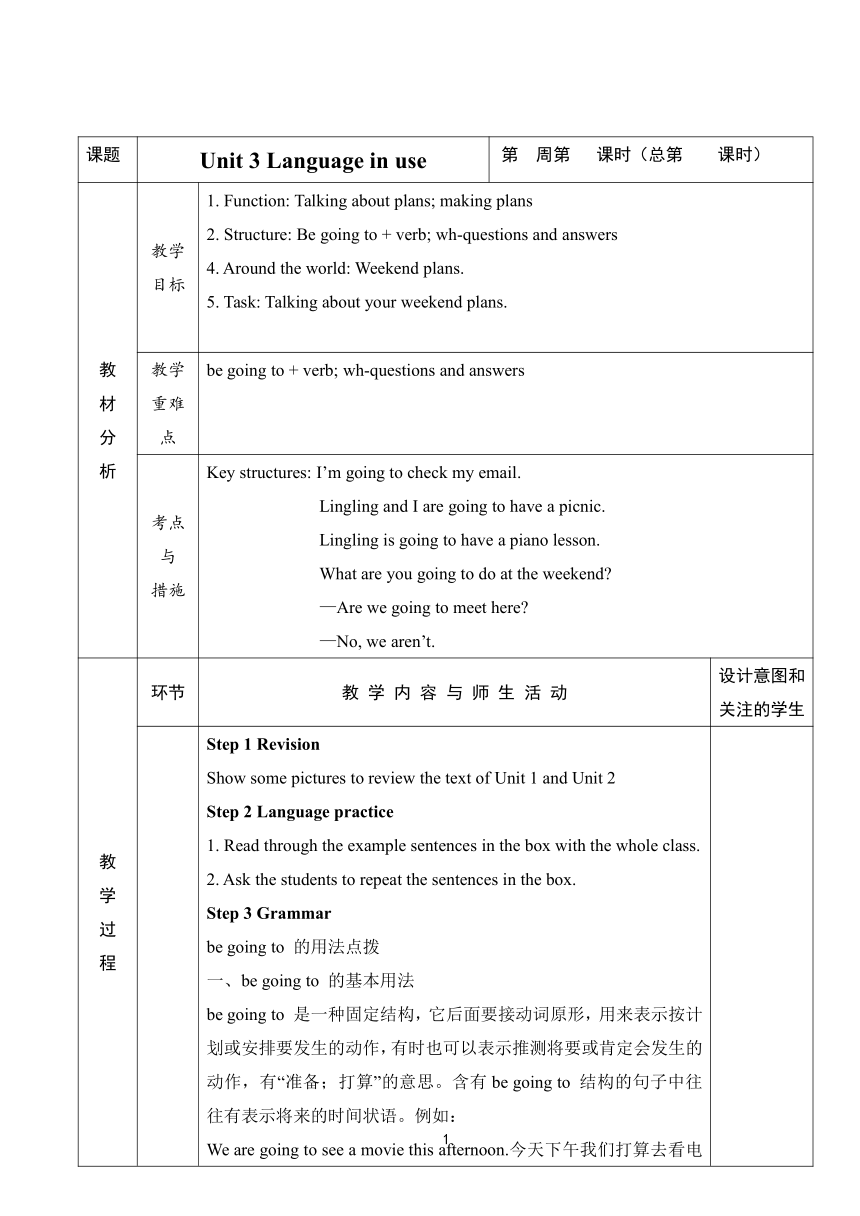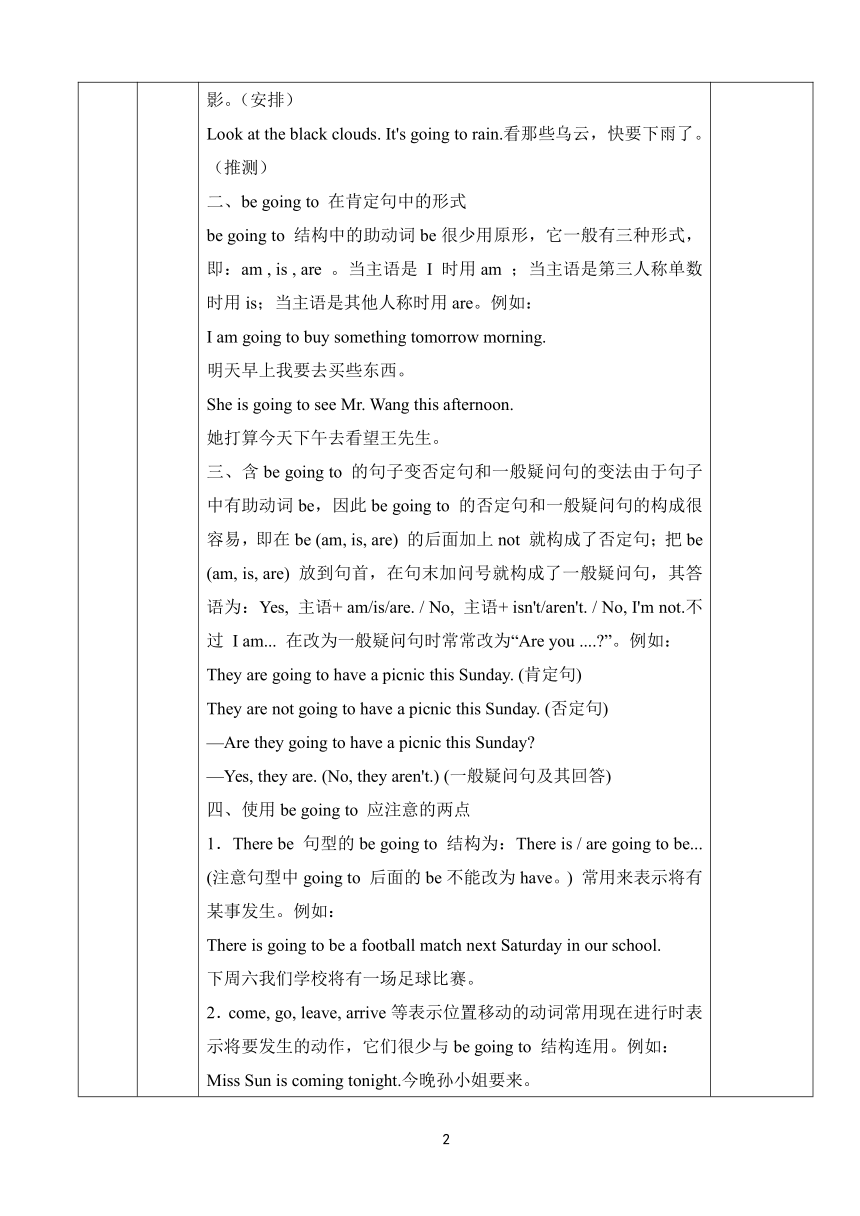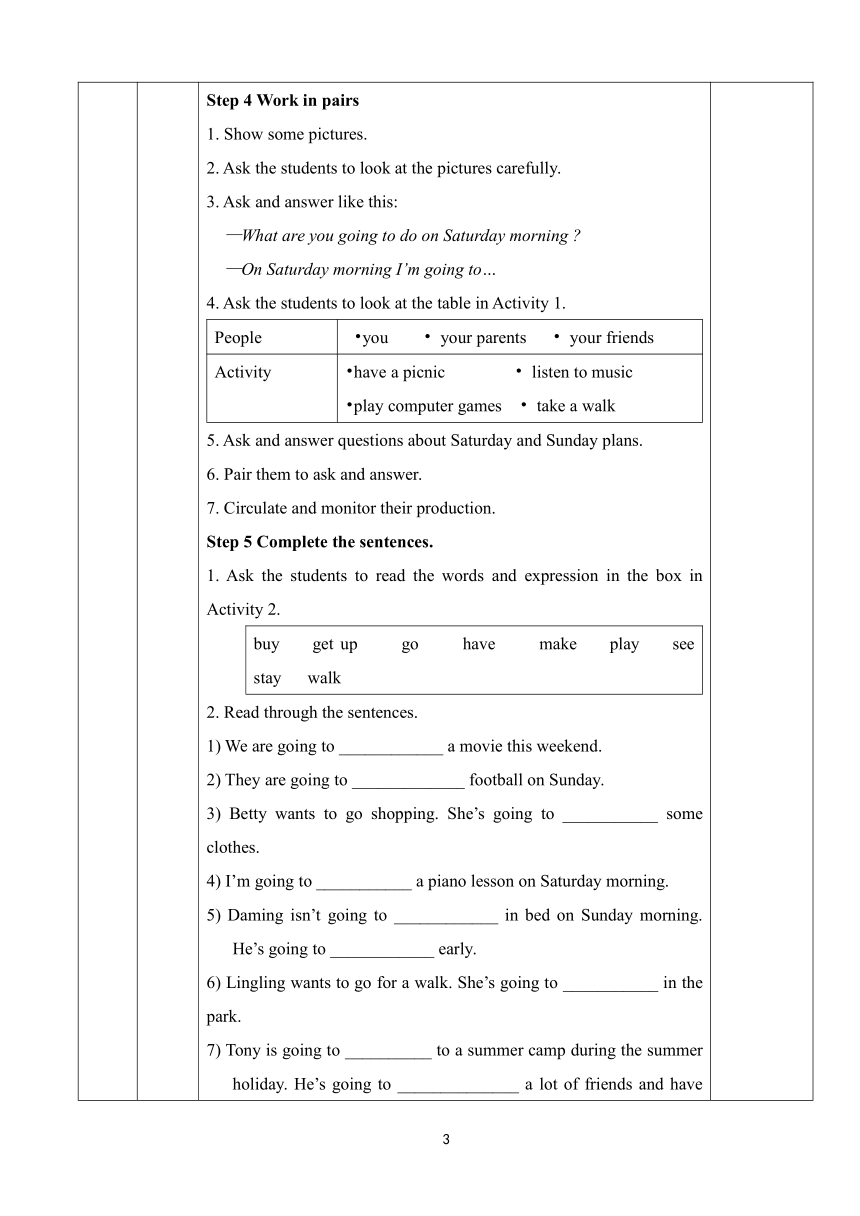外研版 七年级上 Module 3 Unit 3 Language in use. 教案(表格式)
文档属性
| 名称 | 外研版 七年级上 Module 3 Unit 3 Language in use. 教案(表格式) |  | |
| 格式 | doc | ||
| 文件大小 | 56.0KB | ||
| 资源类型 | 教案 | ||
| 版本资源 | 外研版 | ||
| 科目 | 英语 | ||
| 更新时间 | 2022-07-18 16:06:54 | ||
图片预览



文档简介
课题 Unit 3 Language in use 第 周第 课时(总第 课时)
教材分析 教学目标 1. Function: Talking about plans; making plans2. Structure: Be going to + verb; wh-questions and answers4. Around the world: Weekend plans.5. Task: Talking about your weekend plans.
教学重难点 be going to + verb; wh-questions and answers
考点与措施 Key structures: I’m going to check my email.Lingling and I are going to have a picnic.Lingling is going to have a piano lesson.What are you going to do at the weekend —Are we going to meet here —No, we aren’t.
教学过程 环节 教 学 内 容 与 师 生 活 动 设计意图和关注的学生
Step 1 RevisionShow some pictures to review the text of Unit 1 and Unit 2 Step 2 Language practice1. Read through the example sentences in the box with the whole class.2. Ask the students to repeat the sentences in the box.Step 3 Grammarbe going to 的用法点拨一、be going to 的基本用法be going to 是一种固定结构,它后面要接动词原形,用来表示按计划或安排要发生的动作,有时也可以表示推测将要或肯定会发生的动作,有“准备;打算”的意思。含有be going to 结构的句子中往往有表示将来的时间状语。例如: We are going to see a movie this afternoon.今天下午我们打算去看电影。(安排)Look at the black clouds. It's going to rain.看那些乌云,快要下雨了。(推测) 二、be going to 在肯定句中的形式 be going to 结构中的助动词be很少用原形,它一般有三种形式,即:am , is , are 。当主语是 I 时用am ;当主语是第三人称单数时用is;当主语是其他人称时用are。例如:I am going to buy something tomorrow morning.明天早上我要去买些东西。 She is going to see Mr. Wang this afternoon.她打算今天下午去看望王先生。三、含be going to 的句子变否定句和一般疑问句的变法由于句子中有助动词be,因此be going to 的否定句和一般疑问句的构成很容易,即在be (am, is, are) 的后面加上not 就构成了否定句;把be (am, is, are) 放到句首,在句末加问号就构成了一般疑问句,其答语为:Yes, 主语+ am/is/are. / No, 主语+ isn't/aren't. / No, I'm not.不过 I am... 在改为一般疑问句时常常改为“Are you .... ”。例如: They are going to have a picnic this Sunday. (肯定句) They are not going to have a picnic this Sunday. (否定句)—Are they going to have a picnic this Sunday —Yes, they are. (No, they aren't.) (一般疑问句及其回答)四、使用be going to 应注意的两点 1.There be 句型的be going to 结构为:There is / are going to be... (注意句型中going to 后面的be不能改为have。) 常用来表示将有某事发生。例如: There is going to be a football match next Saturday in our school.下周六我们学校将有一场足球比赛。2.come, go, leave, arrive等表示位置移动的动词常用现在进行时表示将要发生的动作,它们很少与be going to 结构连用。例如: Miss Sun is coming tonight.今晚孙小姐要来。Step 4 Work in pairs1. Show some pictures. 2. Ask the students to look at the pictures carefully.3. Ask and answer like this:—What are you going to do on Saturday morning —On Saturday morning I’m going to…4. Ask the students to look at the table in Activity 1. People you your parents your friendsActivity have a picnic listen to music play computer games take a walk5. Ask and answer questions about Saturday and Sunday plans.6. Pair them to ask and answer.7. Circulate and monitor their production.Step 5 Complete the sentences.1. Ask the students to read the words and expression in the box in Activity 2.buy get up go have make play see stay walk2. Read through the sentences. 1) We are going to ____________ a movie this weekend.2) They are going to _____________ football on Sunday.3) Betty wants to go shopping. She’s going to ___________ some clothes.4) I’m going to ___________ a piano lesson on Saturday morning.5) Daming isn’t going to ____________ in bed on Sunday morning. He’s going to ____________ early.6) Lingling wants to go for a walk. She’s going to ___________ in the park.7) Tony is going to __________ to a summer camp during the summer holiday. He’s going to ______________ a lot of friends and have fun.3. Complete the sentences with the correct form of the words and expression from the box.4. Ask the students to check with a partner.5. Check the answers: Keys: 1.see 2. play 3. buy 4. have 5. stay, get up 6. walk 7.go , makeStep 6 Do exercises1. Put the words in the correct order to make questions.1) check / you / going / are / to / email / you / 2) they / on / in / park / are / going / to/ Sunday / litter / collect / the / 3) some / going / is / new / buy / Betty / to / clothes 4) this / a / you / see / going / are / to / movie / evening / 5) computer / Tony / to /play / a / is / going / game / 2. Ask the students to check with a partner.3. Check the answers: Keys: 1) Are you going to check your email 2) Are they going to collect the litter in the park on Sunday 3) Is Betty going to buy some new clothes 4) Are you going to see a movie this evening 5) Is Tony going to play a computer game 4. Now complete the answers to the questions. Use short forms.1) Yes, I _________. 4) No, we ____________.2) Yes, they _________. 5) Yes, he ____________.3 ) __________, she isn’t.5. Ask the students to check with a partner.6. Check the answers: Keys: 1. am 2. are 3. No 4. aren’t 5. isStep 7 Around the world: Weekend plans1. Ask the students to look at the picture and discuss what they can see.2. Read through the information with the whole class.3. Complete the table.Young people in the UKSaturday morning1. __________________________________Saturday afternoon2. __________________________________Sunday morning3. __________________________________Sunday afternoon4. __________________________________Sunday evening5. __________________________________4. Ask the students to check with a partner.5. Check the answers: Keys: 1. do some sports 2. go shopping 3. get up late, see friends and have lunch with their family 4. go for a walk 5. do their homeworkStep 8 Module task: Talking about your weekend plans1.Work in groups of three. Talk about what you’re going to do at the weekend.A: What are you going to do at the weekend
B: I’m going to …(to C ) What about you C: I’m going to…2. Now write down your ideas.3. Make plans to do things together with the others in your group. Make a group diary for next weekend.Saturday morningSunday morningSaturday afternoonSunday afternoonSaturday eveningSunday eveningStep 9 HomeworkTalk about your group diary to the whole class and write it down.
教学反思 学生合作学习效果良好,环节清晰,教学时间安排紧凑,今后要加深知识的难度。
PAGE
6
教材分析 教学目标 1. Function: Talking about plans; making plans2. Structure: Be going to + verb; wh-questions and answers4. Around the world: Weekend plans.5. Task: Talking about your weekend plans.
教学重难点 be going to + verb; wh-questions and answers
考点与措施 Key structures: I’m going to check my email.Lingling and I are going to have a picnic.Lingling is going to have a piano lesson.What are you going to do at the weekend —Are we going to meet here —No, we aren’t.
教学过程 环节 教 学 内 容 与 师 生 活 动 设计意图和关注的学生
Step 1 RevisionShow some pictures to review the text of Unit 1 and Unit 2 Step 2 Language practice1. Read through the example sentences in the box with the whole class.2. Ask the students to repeat the sentences in the box.Step 3 Grammarbe going to 的用法点拨一、be going to 的基本用法be going to 是一种固定结构,它后面要接动词原形,用来表示按计划或安排要发生的动作,有时也可以表示推测将要或肯定会发生的动作,有“准备;打算”的意思。含有be going to 结构的句子中往往有表示将来的时间状语。例如: We are going to see a movie this afternoon.今天下午我们打算去看电影。(安排)Look at the black clouds. It's going to rain.看那些乌云,快要下雨了。(推测) 二、be going to 在肯定句中的形式 be going to 结构中的助动词be很少用原形,它一般有三种形式,即:am , is , are 。当主语是 I 时用am ;当主语是第三人称单数时用is;当主语是其他人称时用are。例如:I am going to buy something tomorrow morning.明天早上我要去买些东西。 She is going to see Mr. Wang this afternoon.她打算今天下午去看望王先生。三、含be going to 的句子变否定句和一般疑问句的变法由于句子中有助动词be,因此be going to 的否定句和一般疑问句的构成很容易,即在be (am, is, are) 的后面加上not 就构成了否定句;把be (am, is, are) 放到句首,在句末加问号就构成了一般疑问句,其答语为:Yes, 主语+ am/is/are. / No, 主语+ isn't/aren't. / No, I'm not.不过 I am... 在改为一般疑问句时常常改为“Are you .... ”。例如: They are going to have a picnic this Sunday. (肯定句) They are not going to have a picnic this Sunday. (否定句)—Are they going to have a picnic this Sunday —Yes, they are. (No, they aren't.) (一般疑问句及其回答)四、使用be going to 应注意的两点 1.There be 句型的be going to 结构为:There is / are going to be... (注意句型中going to 后面的be不能改为have。) 常用来表示将有某事发生。例如: There is going to be a football match next Saturday in our school.下周六我们学校将有一场足球比赛。2.come, go, leave, arrive等表示位置移动的动词常用现在进行时表示将要发生的动作,它们很少与be going to 结构连用。例如: Miss Sun is coming tonight.今晚孙小姐要来。Step 4 Work in pairs1. Show some pictures. 2. Ask the students to look at the pictures carefully.3. Ask and answer like this:—What are you going to do on Saturday morning —On Saturday morning I’m going to…4. Ask the students to look at the table in Activity 1. People you your parents your friendsActivity have a picnic listen to music play computer games take a walk5. Ask and answer questions about Saturday and Sunday plans.6. Pair them to ask and answer.7. Circulate and monitor their production.Step 5 Complete the sentences.1. Ask the students to read the words and expression in the box in Activity 2.buy get up go have make play see stay walk2. Read through the sentences. 1) We are going to ____________ a movie this weekend.2) They are going to _____________ football on Sunday.3) Betty wants to go shopping. She’s going to ___________ some clothes.4) I’m going to ___________ a piano lesson on Saturday morning.5) Daming isn’t going to ____________ in bed on Sunday morning. He’s going to ____________ early.6) Lingling wants to go for a walk. She’s going to ___________ in the park.7) Tony is going to __________ to a summer camp during the summer holiday. He’s going to ______________ a lot of friends and have fun.3. Complete the sentences with the correct form of the words and expression from the box.4. Ask the students to check with a partner.5. Check the answers: Keys: 1.see 2. play 3. buy 4. have 5. stay, get up 6. walk 7.go , makeStep 6 Do exercises1. Put the words in the correct order to make questions.1) check / you / going / are / to / email / you / 2) they / on / in / park / are / going / to/ Sunday / litter / collect / the / 3) some / going / is / new / buy / Betty / to / clothes 4) this / a / you / see / going / are / to / movie / evening / 5) computer / Tony / to /play / a / is / going / game / 2. Ask the students to check with a partner.3. Check the answers: Keys: 1) Are you going to check your email 2) Are they going to collect the litter in the park on Sunday 3) Is Betty going to buy some new clothes 4) Are you going to see a movie this evening 5) Is Tony going to play a computer game 4. Now complete the answers to the questions. Use short forms.1) Yes, I _________. 4) No, we ____________.2) Yes, they _________. 5) Yes, he ____________.3 ) __________, she isn’t.5. Ask the students to check with a partner.6. Check the answers: Keys: 1. am 2. are 3. No 4. aren’t 5. isStep 7 Around the world: Weekend plans1. Ask the students to look at the picture and discuss what they can see.2. Read through the information with the whole class.3. Complete the table.Young people in the UKSaturday morning1. __________________________________Saturday afternoon2. __________________________________Sunday morning3. __________________________________Sunday afternoon4. __________________________________Sunday evening5. __________________________________4. Ask the students to check with a partner.5. Check the answers: Keys: 1. do some sports 2. go shopping 3. get up late, see friends and have lunch with their family 4. go for a walk 5. do their homeworkStep 8 Module task: Talking about your weekend plans1.Work in groups of three. Talk about what you’re going to do at the weekend.A: What are you going to do at the weekend
B: I’m going to …(to C ) What about you C: I’m going to…2. Now write down your ideas.3. Make plans to do things together with the others in your group. Make a group diary for next weekend.Saturday morningSunday morningSaturday afternoonSunday afternoonSaturday eveningSunday eveningStep 9 HomeworkTalk about your group diary to the whole class and write it down.
教学反思 学生合作学习效果良好,环节清晰,教学时间安排紧凑,今后要加深知识的难度。
PAGE
6
同课章节目录
- Starte
- Module 1 My teacher and my friends
- Module 2 My English lesson
- Module 3 My English book
- Module 4 My everyday life
- Module 1 My classmates
- Unit 1 Nice to meet you.
- Unit 2 I'm Wang Lingling and I'm thirteen years ol
- Unit 3 Language in use.
- Module 2 My family
- Unit 1 Is this your mum?
- Unit 2 These are my parents.
- Unit 3 Language in use.
- Module 3 My school
- Unit 1 There are thirty students in my class.
- Unit 2 The library is on the left of the playgroun
- Unit 3 Language in use.
- Module 4 Healthy food
- Unit 1 We've got lots of apples.
- Unit 2 Is your food and drink healthy?
- Unit 3 Language in use.
- Module 5 My school day
- Unit 1 I love history.
- Unit 2 We start work at nine o'clock.
- Unit 3 Language in use.
- Revision module A
- Module 6 A trip to the zoo
- Unit 1 Does it eat meat?
- Unit 2 The tiger lives in Asia.
- Unit 3 Language in use.
- Module 7 Computers
- Unit 1 How do I write my homework on the computer?
- Unit 2 When do you use a computer?
- Unit 3 Language in use.
- Module 8 Choosing presents
- Unit 1 I always like birthday parties.
- Unit 2 She often goes to concerts.
- Unit 3 Language in use.
- Module 9 People and places
- Unit 1 We're enjoying the school trip a lot.
- Unit 2 They're waiting for buses or trains.
- Unit 3 Language in use.
- Module 10 Spring Festival
- Unit 1 Are you getting ready for Spring Festival?
- Unit 2 My mother's cleaning our houses and sweepin
- Unit 3 Language in use.
- Revision module B
